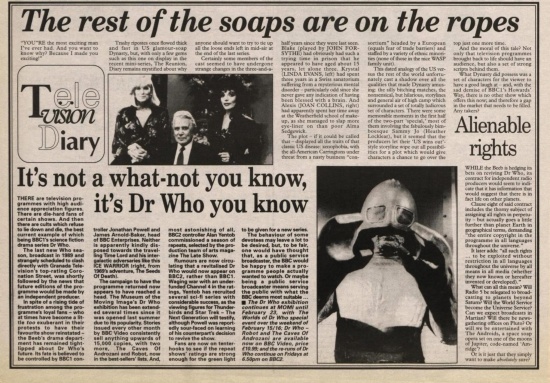It's not a what-not you know, it's Dr Who you know
- Publication: The Stage and Television Today
- Date: 1992-01-23
- Author:
- Page: 20
- Language: English
THERE are television programmes with high audience appreciation figures. There are die-hard fans of certain shows. And then there are cults which refuse to lie down and die, the best current example of which being BBC1's science fiction drama series Dr Who.
The last new Who season, broadcast in 1989 and strangely scheduled to clash directly with Granada Television's top-rating Coronation Street, was shortly followed by the news that future editions of the programme would be made by an independent producer.
In spite of a rising tide of frustration among the programme's loyal fans - who at times have become a little too exuberant in their protests to have their favourite show reinstated - the Beeb's drama department has remained tightlipped about Dr Who's future. Its fate is believed to be controlled by BBC1 controller Jonathan Powell and James Arnold-Baker, head of BBC Enterprises. Neither is apparently kindly disposed towards the travelling Time Lord and his intergalactic adversaries like this ICE WARRIOR (right, from 1969's adventure, The Seeds Of Death).
The campaign to have the programme returned now appears to have reached a head. The Museum of the Moving Image's Dr Who exhibition has been extended several times since it was opened last summer due to its popularity. Stories issued every other month by BBC Video consistently sell anything upwards of 15,000 copies, with two more, The Caves Of Androzani and Robot, now in the best-sellers' lists. And, most astonishing of all, BBC2 controller Alan Yentob commissioned a season of repeats, selected by the production team of arts magazine The Late Show.
Rumours are now circulating that a revitalised Dr Who would now appear on BBC2, rather than BBC1. Waging war with an underfunded Channel 4 in the ratings, Yentob has recruited several sci-fi series with considerable success, as the viewing figures for Thunderbirds and Star Trek - The Next Generation will testify, although Powell was reportedly sour-faced on learning of his counterpart's decision to revive the show.
Fans are now on tenterhooks to see if the repeat shows' ratings are strong enough for the green light to be given for a new series.
The behaviour of some devotees may leave a lot to be desired, but, to be fair, one would have thought that, as a public service broadcaster, the BBC would be happy to make a programme people actually wanted to watch. Or maybe being a public service broadcaster means serving the public with what the BBC deems most suitable ...
• The Dr Who exhibition continues at MOMI until February 23, with The Worlds of Dr Who special event over the weekend of February 15/16; Dr Who - Robot and The Caves Of Androzani are available now on BBC Video, price £10.99; and the re-runs of Dr Who continue on Fridays at 6.50pm on BBC2.
Alienable rights
WHILE the Beeb is hedging its bets on reviving Dr Who, its contract for independent radio producers would seem to indicate that it has information that would suggest that there is in fact life on other planets.
Clause eight of said contract includes the thorny subject of assigning all rights in perpetuity - but actually goes a little further than planet Earth in geographical terms, demanding "the entire copyright in the programme in all languages throughout the universe."
It later adds: "all such rights to be exploited without restriction in all languages throughout the universe by all means in all media (whether they now known or hereafter invented or developed)."
What can all this mean? Will Radio 5 be relegated to broadcasting to planets beyond Saturn? Will the World Service become the Universe Service? Can we expect broadcasts in Martian? Will there be news-gathering offices on Pluto? Or will we be entertained with The Androids, a space soap opera set on one of the moons of Jupiter, code-named 'Am-ridge'?
Or is it just that they simply want to make absolutely sure?
Disclaimer: These citations are created on-the-fly using primitive parsing techniques. You should double-check all citations. Send feedback to whovian@cuttingsarchive.org
- APA 6th ed.: (1992-01-23). It's not a what-not you know, it's Dr Who you know. The Stage and Television Today p. 20.
- MLA 7th ed.: "It's not a what-not you know, it's Dr Who you know." The Stage and Television Today [add city] 1992-01-23, 20. Print.
- Chicago 15th ed.: "It's not a what-not you know, it's Dr Who you know." The Stage and Television Today, edition, sec., 1992-01-23
- Turabian: "It's not a what-not you know, it's Dr Who you know." The Stage and Television Today, 1992-01-23, section, 20 edition.
- Wikipedia (this article): <ref>{{cite news| title=It's not a what-not you know, it's Dr Who you know | url=http://cuttingsarchive.org/index.php/It%27s_not_a_what-not_you_know,_it%27s_Dr_Who_you_know | work=The Stage and Television Today | pages=20 | date=1992-01-23 | via=Doctor Who Cuttings Archive | accessdate=25 December 2025 }}</ref>
- Wikipedia (this page): <ref>{{cite web | title=It's not a what-not you know, it's Dr Who you know | url=http://cuttingsarchive.org/index.php/It%27s_not_a_what-not_you_know,_it%27s_Dr_Who_you_know | work=Doctor Who Cuttings Archive | accessdate=25 December 2025}}</ref>
